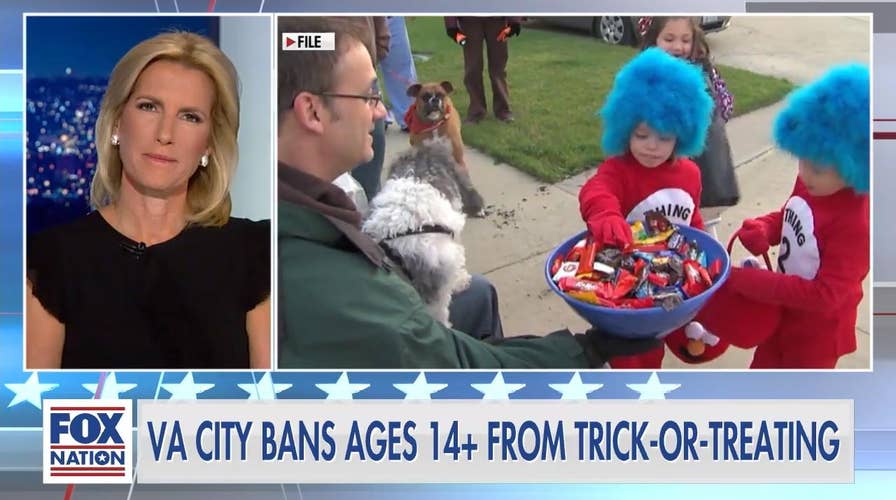A libertarian legal group is warning trick-or-treaters that they may fall victim to Halloween-related laws around the country that it says violate the First Amendment.
In a blog post this week, the Pacific Legal Foundation highlighted several towns that ban children over the age of 12 from trick-or-treating and argued "a ban on going door-to-door violates our First Amendment rights."
"What is the scariest thing about Halloween?" the post asked. "How about the possibility that trick-or-treaters out after 8 p.m., or teenagers trick-or-treating at any time can be thrown in jail? Unfortunately, that nightmarish scenario is a reality in some parts of the country."
INTERNET REACTS TO TRUMP PUTTING CANDY ON TOP OF CHILD'S HALLOWEEN COSTUME
The PLF links to a news story by Our Community Now listing the various trick-or-treating laws in the Hampton Roads area of Virginia.
Virginia Beach, Norfolk, Suffolk, York County, Portsmouth, Newport News, Hampton, Williamsburg and James City County all have "12 and under" age limits for trick-or-treaters, according to the report.
Chesapeake, which has previously come under fire for banning teens from participating in the Halloween tradition, recently increased its age limit to 14.
Halloween-themed free speech violations don't end there, according to the PLF.
Bellville, Ill., bans anyone over 12 years old from trick-or-treating and so does Meridian, Miss., which also does not allow anyone over 12 "to wear a mask or any other disguise unless they get a permission slip from the mayor or chief of police," according to the Mississippi Center for Public Policy.
Bellville mayor, Mark Eckert, spoke with Slate in an interview published Wednesday, defending the reasoning behind his town's trick-or-treating age limit.
"What started happening in Belleville was that we saw and heard from a lot of seniors particularly, that big kids – kids in high school – kids were coming to the door as late as 10 o’clock at night and seniors were afraid to open the door and they were afraid if they didn’t open the door that something was going to happen to their house," Eckert told Slate. "And likewise I had some conversation with a number of young single moms who said, 'Mr. Eckert, Halloween scares us because there’s so many big kids that come around late at night.'"

In some cities children over twelve who go trick-or-treating are breaking the law. ((iStock))
MSNBC ANALYST PENS WASHINGTON POST OP-ED CALLING FOR 'HATE SPEECH LAW,' FACES BACKLASH
Eckert went on to say that teens would sometimes force doors open, pushing over elderly people who cracked the door to see who was there.
Alabama goes even further than the towns with trick-or-treating laws and bans religiously themed costumes wholesale, across the entire state.
A person in public in Alabama wearing a costume "of any religion, or nun, priest, rabbi or other member of the clergy, is guilty of a misdemeanor and, upon conviction, shall be punished by a fine not exceeding $500.00 or confinement in the county jail for not more than one year, or by both such fine and imprisonment."
The PLF argues these laws are both unnecessary and unconstitutional.
"There are a variety of reasons a teenager may go trick-or-treating," according to the post. "For instance, trick-or-treating may be an opportunity for a teenager to spend quality time with his little siblings. There are also teenagers who are developmentally delayed for whom trick-or-treating is particularly age-appropriate. Or a teenager may want to trick-or-treat for charitable causes such as UNICEF."
"More fundamentally, however, a ban on going door to door violates our First Amendment rights. The Supreme Court has repeatedly upheld the right of individuals to engage in door-to-door solicitation for a variety of causes, including expressive activity and charitable fundraising. In its most recent decision on the subject, the Supreme Court emphasized 'the important role that door-to-door canvassing and pamphleteering has played in our constitutional tradition of free and open discussion.'"
CLICK HERE TO GET THE FOX NEWS APP
Wearing costumes is also an expressive activity, the PLF argues, adding to the layers of protection the First Amendment drapes over trick-or-treating.
The PLF does, however, acknowledge cities may impose some regulations on trick-or-treating, such as where, when and how it may happen.
"For instance, a city could end trick-or-treating at midnight," it says. "But absurd punishments for trick-or-treaters and a complete ban on anyone over a certain age goes too far."













































